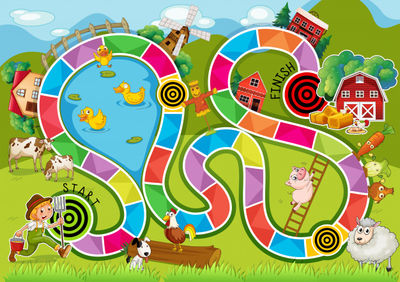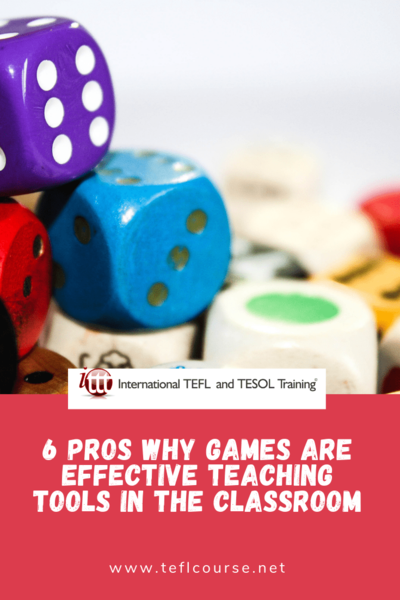6 Pros Why Games Are Effective Teaching Tools in the Classroom

"Who wants to play a game?" I would ask my students this question whenever I start a lesson. The resounding answer would always be, "Me!" In all my years of teaching, I have yet to see a student refuse to play a game. Games are effective teaching tools because it makes learning interesting and fun. I can tell you more reasons why games are good for teaching. Now let me give at least six of them.
Table of Contents
Listen to this blog post:
1. Practical Importance
Firstly, games make you practice a lot. As the saying goes, 'practice makes perfect.' In everything you do, whenever you play a game over and over, your mind gets better at it too. For example, when students play 'Boggle,' they have acquired many three- and four-letter words by playing numerous times. When they play, they use these words over and over again. However, to win consistently, they read more books in order to increase their word knowledge. So that when they get another opportunity to play 'Boggle,' they have more chances of winning with an improved vocabulary.

Also Read: What's the best way to apply for TEFL jobs?
2. Social Importance
Secondly, the games are good at developing social skills. Is it not when you play a game, you do it with your friends or acquaintances? In a classroom setting, you play with your classmates. As you play, you will have to temper your emotions like how you can be sensitive to the feelings of others. Especially during the early years, some students would cry whenever they lose a game. The other students would try to console their classmates by saying, "Don't be sad. You are good at playing video games." or "Don't worry! You have many friends who like you no matter what." While others cry, others get angry and say, "Well, they won because they cheated anyway." I always teach them to practice good sportsmanship in any game they play. I remind them that it is just a game and that the main thing is to learn and have fun at the same time.
3. Critical Thinking
Thirdly, games cultivate critical thinking. These are games that require good strategies in order to win. Let me explain. In a game of chess, when your opponent's defenses are too strong up front, you can try to attack at the back. When you do that, your opponent feels confused because he does not know what you are up to anymore. Once your opponent gets confused, he can lose his composure and get rattled. This is the right time to make an attack and checkmate! Chess teaches students how to use psychological warfare. Now take the game of Monopoly. Passing up the chances of buying low-cost property, you concentrate on buying a high-cost property. After purchasing them, you buy and place houses on them to increase their rental prices. Whenever an opponent drops by, he has to pay your rent. Finally, after saving up all the rental income, you upgrade them by buying hotels. Any player visiting any of your property has to pay your hotel rent. In the process, they go bankrupt while you get rich and win. Monopoly, on the other hand, teaches students financial management.

4. Memory
Next, games help retain information. I always think that the best way to learn something is to visualize it in your head. Memory games are good for remembering things. Whenever I want my students to know the different flags of the world, I make them play a memory card game of flags. After playing this game, they always remember the colorful ones like the United Kingdom, Spain, and South Korea while the simpler flags are the easiest to remember such as Japan, Vietnam, and China.
5. Creative Thinking
Another reason is that games develop your creativity. I like making my students play 'charades.' In these games, they are not allowed to say the 'word' but to use body language. Some students use codes like they gesture their ears which means that the word sounds like another word. Or when they have to describe a word that has three syllables, they would show three fingers up in the air. Then they would act out the word and try to mimic something until their teammates guess the word within a certain time limit. Another favorite game of ours is 'Pictionary.' In this game, students have to draw a picture of the word they are trying to convey. Sometimes if the word is not easy to draw, they break the word into parts. Then their teammates will guess them by combining all these parts into one word. These games make them think on their toes and are as creative as possible. If not, they will lose the game.

Also Read: The Necessity of Translation for the English Language Learners
6. Confidence
Lastly, games build self-confidence. My students love to compete in Math. After teaching the basics and giving them weeks of assignments, I make them compete using the floor tiles of our classroom. When they say the right answer, they advance one tile. It is a race in which whoever first reaches the finish line, wins. This is how I drill them with addition, subtraction, multiplication, and division. I use my mini-competitions as assessment time. It is also a way for them to reflect if they need help in understanding math concepts or they have to practice and study more. As they win, they get more confident about their math skills. The more they get confident, they get encouraged to try and excel at other subjects like English, Science and Social Studies.
## Do you want to teach English abroad? Take a TEFL course today?
These are the reasons why I believe games are good for learning. As students play, they are improving their minds, social skills, creativity, knowledge, memory, and self-esteem. So how do I know for sure if games are effective for teaching? One time, a student of mine asked me, "Are you still going to be our Grade 4 teacher next year?" I asked her, "Why? Do you want me to be your Grade 4 teacher as well?" She said, "Yes, because you make us smart while you make learning fun and easy too!" Need I say more?
Related Articles:
- How do I get a job teaching English in South Korea
- 10 Questions You Need to Ask Before Enrolling In a TEFL Course
- The 10 Best Destinations for Teaching English Abroad in 2018
- Online or In-Class - Which TEFL Course Should You Take?
- The Best Government Programs For Teaching English Abroad
- What Scams to Look Out for When Looking for TEFL Jobs




